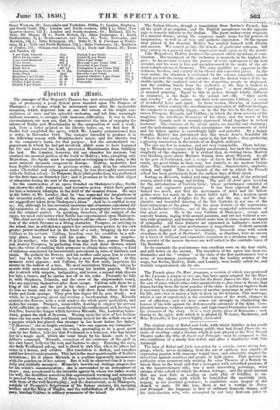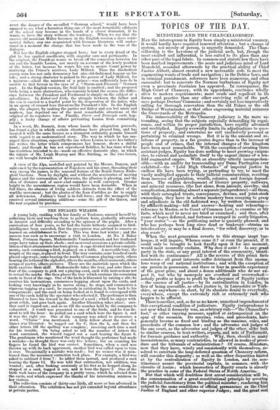The original play of Kabul end _Liebe, with which Schiller
in his youth delighted that revolutionary German public that had found Prism the re- verse of exciting—and a version which is now played at the New Strand Theatre under the title of Power and Principle—may be compared to the two conditions of a sturdy lion before and after a familiarity with Van Amburgh. The tone of Kabul used Liebe was given by a certain coarse strong lan- guage, which, never shrinking from the use of epithets, was capable of expressing passion with immense tumid force, and admirably adapted for invectives against courtiers and people in high places. That persons in authority were monsters only waiting for some Theseus of a Bursch to knock them on the head, and that a youngster with unbridled passions, if on the insurrectionary side, -was a most interesting -personage, were axioms of the school to which the drama belongs ; and the great interest that one now feels in souring an early play of Schiller, is ex- cited by the vigour with which he brandishes the unwieldy club, hoping, in his youthful petulance, to annihilate some dragon of the chinch or state. Of this tone there is not a vestige in Power and Principle: the language is that of ordinary domestic drama, and the Anti-Jacobin wits, who attempted by not very first-rate jokes tse
avert the danger of the so-called "German school," would have been amazed to see what a harmless thing one of the most formidable offshoots of the school may become in the hands of a clever dramatist, if he wants to have the story without the tendency. When we say that the caustic old musician Mater becomes in the English version a mere senti- mental father, any one acquainted with German literature will under- stand in a moment the change that has been made in the tone of the dialogue.
Nor has the English adapter stopped here' but to every detail of the plot he has applied emollients, with singular care and pertinacity. In the original, the President wants to break off the connexion between his son and the humble Louisa, not merely on account of the lowly position of the latter, but because he wants his son to secure Court power by marrying the Prince's mistress, Lady Milford. Thus the disobedient young man has not only democracy but also old-fashioned honour on his aide; and a strong character is gained in the person of Lady Milford, for a mistress—albeit the mistress of a prince—was sufficiently hors de la societe to find favour in the eyes of a " Storm-and-Pressure " German poet. In the English version, the frail lady is omitted; and the proposed bride being a mere abstraction, who remains behind the scenes, the differ- ence between the President and Ferdinand is simply on the subject of a mesalliance. In Kabul und Liebe, the struggle between the father and the son is carried to a fearful point by the desperation of the latter, who in an agony of crossed love threatens the President's life. In the English play, the adapter, by making the parties not father and son but uncle and nephew, has deprived one of the most remarkable situations of the original of its repulsive tone. Finally, Power and Principle ends hap- pily; a lucky change of affairs preventing Louisa from committing suicide.
In a word, Mr. Barnett, from whose hands the adaptation proceeds, has found a play in which certain situations have pleased him, and has treated it with the same licence as a dramatist ordinarily permits himself with regard to an =dramatized story. The way in which he has ma- naged these situations, especially the one where Louisa to save her father's life writes the letter which compromises her honour, shows a skilful hand; and though he has not reproduced Schiller, he has done what he has doubtless intended to do—made an effective domestic play, in which the talents of Mr. Leigh Murray and Mrs. Stirling, as the two lovers, are well brought forward.



























 Previous page
Previous page